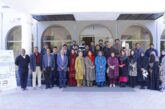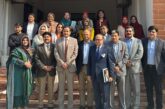
Media Foundation 360 (MF360), in collaboration with the U.S. Consulate Karachi, successfully conducted a three-day workshop titled “Increasing Awareness of the U.S.-Pakistan Partnership Through Reporting Tours” in Karachi. This initiative aimed to empower journalists and media professionals with the knowledge and skills required for accurate and insightful reporting on the multifaceted relationship between the United States and Pakistan. The workshop provided participants with valuable training in fact-checking, investigative journalism, interview techniques, and visual storytelling, ultimately fostering a more informed and nuanced discourse on bilateral relations.
The first day commenced with an engaging session titled “An Introduction to Media Training,” led by Mujtaba Rathore. Participants were warmly welcomed and encouraged to interact through icebreaking activities that set a collaborative tone for the workshop. This was followed by a pivotal session on “Ensuring Accuracy: Fact-Checking for Credible Reporting,” conducted by senior journalist Tahmina Qureshi. The session introduced Nicholas Lemann’s journalistic methods and addressed the challenges of confirmation bias.


Later, Qureshi led a discussion on “The Role of Investigative Journalism in Safeguarding Democracies,” highlighting its significance in promoting transparency and accountability. Mubasher Bukhari, President of Media Foundation 360, then conducted a session on “Mastering RTI: Crafting Effective Requests for Public Information,” equipping participants with essential skills for accessing public records. The day concluded with an informal tea session where participants reflected on their learnings and engaged in discussions on journalistic integrity.
The second day was dedicated to refining reporting skills through interactive learning. The first session, led by senior journalist Fatima Ali, focused on “The Power of Reliable Sources: Enhancing News with Expert Voices,” emphasizing the role of expert opinions in enriching news coverage. Following this, Tauseef Razi Malik conducted an insightful session on “Interview Techniques for Extracting Key Information,” where participants gained practical skills for conducting effective interviews.
Lubna Jerar Naqvi then presented “Mastering News: From Facts to Perspectives,” guiding participants in transforming raw facts into compelling narratives that resonate with audiences. The final session of the day, “Visual Storytelling: Crafting Compelling Video Reports,” was again led by Fatima Ali. This session introduced participants to the importance of visual elements in news reporting.
The day concluded with a networking dinner at a local Hotel, providing participants with a relaxed environment to discuss ideas, exchange contacts, and strengthen professional relationships.
The final day focused on consolidating learning and strategizing for future reporting. The opening session, “Building Bridges: Reporting on the Pakistan-U.S. Strategic Relationship,” led by Lubna Jerar Naqvi, explored the complexities of bilateral relations and the significance of balanced reporting. This was followed by a presentation by Mubasher Bukhari on “The Future of Reporting: Innovations in Field Reporting and Tours,” which introduced participants to emerging trends and technologies in journalism.
A collaborative session, “Planning Strategies: Share Ideas,” allowed participants to brainstorm and present their ideas for future reporting projects. This fostered creativity and encouraged teamwork among journalists aiming to enhance coverage of the U.S.-Pakistan partnership.
The workshop concluded with a closing ceremony featuring remarks from the trainers, a group photo, and a final tea gathering, celebrating the participants’ achievements and reinforcing their commitment to responsible journalism.
The three-day workshop successfully provided journalists with the necessary tools to enhance their reporting on the U.S.-Pakistan partnership. By focusing on fact-based reporting, investigative techniques, and strategic storytelling, the workshop reinforced the critical role of media in fostering mutual understanding between the two nations. As participants embark on their future reporting endeavors, they are well-equipped to strengthen U.S.-Pakistan relations through accurate, insightful, and responsible journalism.
















